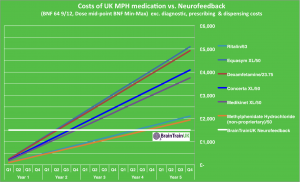What Is The Evidence For Neurofeedback For ADHD ?
In this video, Stuart Black from BrainTrainUK describes how was it discovered that neurofeedback could help with attention and hyperactive problems, the strength of the evidence for neurofeedback for ADHD symptoms, and how the American Academy of Pediatrics reached the conclusion that neurofeedback is a Level 1 Evidence-Based Intervention. What is the current situation in the UK and what is the outlook for a transformation in the treatment of ADHD symptoms ? Downoad a free report on the evidence for Neurofeedback for ADHD.
The story starts when Dr Joel Lubar was treating epileptic patients with neurofeedback. Here is the history of neaurofeedback up to this point. They had treated a epileptic patient who was also hyperactive, and noticed that after neurofeedback training the patient no longer seemed to be hyperactive. This led Dr Lubar to focus on the use of neurofeedback for hyperactivity and later hyperactivity and attention. Learn about the seminal study published in 1976 when they truly demonstrated the power of neurofeedback: The made several children less hyperactive using neurofeedback and then reversed the training to re-introduce the hyperactivity, despite the children taking Ritalin at the same time.
There have been many studies evidencing the power of neurofeedback since, and some particularly strong research in the last 10 years. It was this recent research that led the American Academy of Pediatrics, the US professional body for paediatricians, to reach the conclusion that neurofeedback is a Level 1 Evidence-Based intervention (the highest level they could award). In the UK, the NHS and local authorities take guidance from NICE (National Institute for Health and Care Excellence) who issue clinical guidelines. The full 662 page guideline for ADHD, published by the National Collaborating Centre for Mental Health (NCCMH), issued in 2008, describes neurofeedback, makes the observation that neurofeedback “has been employed as a non-invasive treatment for children with ADHD since the 1970s but is probably not used as a significant intervention in UK clinical practice”.
What will it take for NICE to endorse NF for the NHS ? The American Academy of Pediatrics was persuaded by 3 key pieces of evidence – one of these, a randomsied controlled trial of more than 100 children which wasn’t published until late 2009, after the last NICE guidelines were published. We’re hopeful that the next full assessment by NICE will take this study into account.

Of course, NICE are also interested in cost, and the reality is that because it delivers lasting results, neurofeedback is cheaper than medication over the long-term. We estimate the NHS could save more than £300m over the next 5 years if neurofeedback was adopted.
To find out if Neurofeedback from BrainTrainUK can help you or your loved one, please call us today on 0330 111 3299. Your initial consultation is free and you are under no pressure or obligation to proceed.